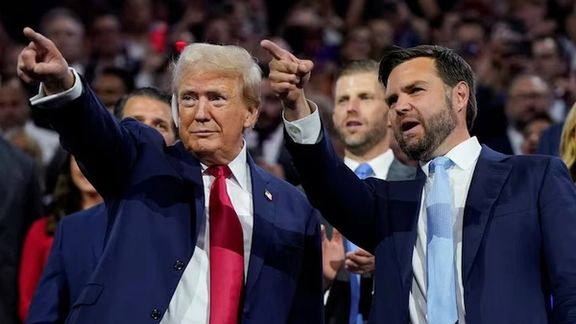The Mission said Sunday that the US election is a domestic issue and dismissed the reports as “lacking credibility.”
Despite the denials, the Trump campaign has said that its internal communications, including sensitive vice-presidential vetting files, were hacked in a breach they believe was orchestrated by Iranian hackers.
The revelation emerged after Politico received emails from an anonymous source containing documents from within Trump’s operation, raising serious concerns about the security of the 2024 presidential election.
The Trump campaign quickly pointed to “foreign sources hostile to the United States,” linking the breach to a report by Microsoft that identified Iranian hackers as responsible for targeting a high-ranking official in a US presidential campaign.
While Microsoft did not name the specific campaign, the timing and nature of the attack suggest that Iran is once again leveraging its cyber capabilities to disrupt American politics.
On Friday, the US announced a $10 million reward for information leading to the identification or whereabouts of six Iranian government hackers accused of carrying out cyberattacks on U.S. water utilities last fall. The State Department emphasized its commitment to tracking down these suspects and holding them accountable.
Tehran’s cyber warfare strategy has evolved into a sophisticated operation aimed at undermining the political process and sowing chaos.
This latest incident is not an isolated case but part of a series of aggressive moves by Iranian cyber actors, including groups linked to the Islamic Revolutionary Guard Corps (IRGC), to infiltrate and influence US elections.
Microsoft’s report highlighted several Iranian cyber groups, including Storm-2035 and Sefid Flood, which have been preparing for influence operations that could incite violence and erode public trust in the electoral process. The breach involving the Trump campaign is just one example of how Tehran’s cyber forces are targeting American institutions.
This hacking incident echoes the 2020 election cycle when Iranian operatives attempted to intimidate voters and spread disinformation. The Islamic Republic’s ongoing efforts to target US political figures and campaigns are widely viewed as part of a broader strategy to retaliate for the US killing of former IRGC Quds Force Commander Qasem Soleimani in 2020.
The timing of the Trump campaign breach is particularly alarming as it coincides with escalating threats from Iran against former President Trump. Recent reports suggest that Iran is actively plotting to assassinate Trump in revenge for Soleimani’s death.
The documents obtained by the hackers, including a 271-page vetting file on Vice Presidential candidate J.D. Vance, reveal sensitive internal deliberations that Tehran could exploit to further its agenda. The implications of this breach extend beyond the Trump campaign, posing a direct threat to the integrity of the 2024 presidential election.
Iran’s cyber operations are not confined to the US. The Iranian government has expanded its reach globally, with hacker groups like MuddyWater targeting governments and private entities in countries such as Saudi Arabia, Turkey, and India. These operations are part of a broader effort by Tehran to extend its influence and disrupt its adversaries on multiple fronts.
The US government has responded with sanctions and indictments against Iranian cyber actors, but these measures have done little to deter Tehran’s ongoing aggression.







